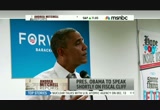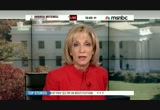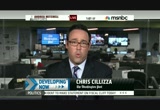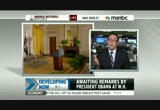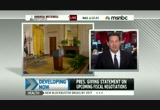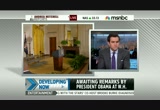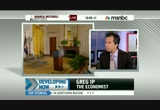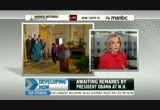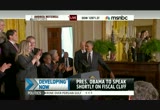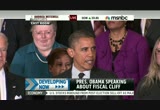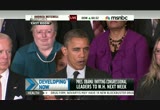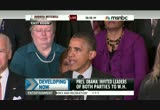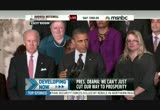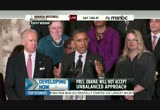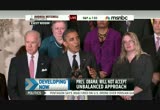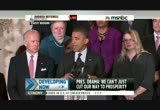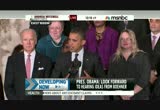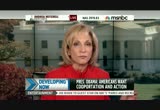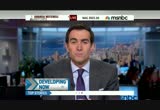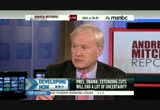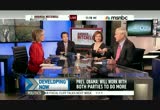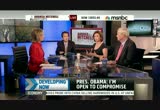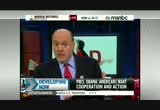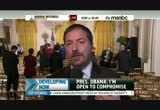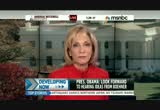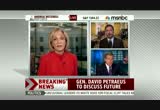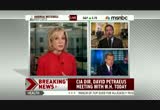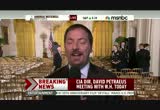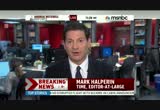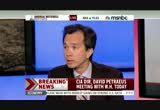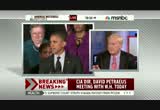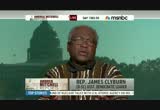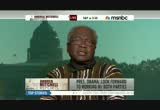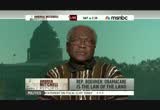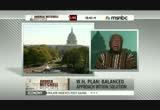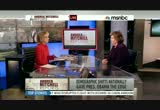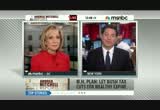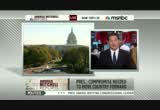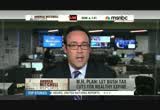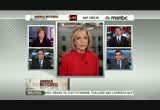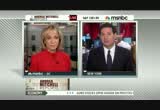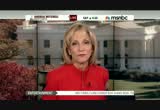tv Andrea Mitchell Reports MSNBC November 9, 2012 10:00am-11:00am PST
10:00 am
since voters gave him a second term and he will announce he's calling congressional leaders to the white house for a summit on the fiscal cliff. in a video released by his campaign an emotional obama thanked his campaign workers in chicago. sn>> >>. >> what you guys have done means that the work i'm doing is approved. i'm really proud of all of you. and -- [ applause ] >> a rare sign of emotion from the president a day after his election. good day, i'm andrea mitchell live in washington. let the negotiations begin. house and senate leaders have now staked out their opening positions. now the president will put down his markers. we're only moments from his scheduled first post-election speech at the white house addressing the most urgent crisis of the lame-duck session,
10:01 am
the fiscal cliff. without a deal, the congressional budget office now projects that if the tax cuts expire and the budget cuts kick in, unemployment would jump to 9.1% by the end of next year and the nation's economy could slide into another recession. joining me for our daily fix, special panel, chris cizilla, msnbc contributor and managing editor of post politics.com, mark halperin, senior political analyst for "time" and msnbc. >> greg, u.s. economics editor for the economist and "new york times" andrew ross sorkin, co-host of "squawk box" on cnbc. welcome all. first chris cizilla and mark halperin, the political side of this, chris, your reporting so far, we've seen speaker boehner today, what chuck schumer had to say, the president's expected to announce that he is inviting all of the leaders to the white house to discuss the fiscal cliff. >> right. i think what we've seen broadly is marking out of territory,
10:02 am
with a strong emphasis on willing to work across the aisle. i don't expect president obama to go into specific detail of how he's going to get this done. i do, however, expect kind of this, you know, the election is now over, let us come together tone. and to be honest, i think he does have a stronger hand in this, than maybe even he thought he might have. simply because of the election results. could be looking at 332 electoral victory, larger than i thought, democrats picking up seats in the senate, picking up some seats in the house, not a huge number. if you're john boehner in the press conference he had, one of his lines was, i think we have a lot of work to do as it relates to the republican party. the republican party is trying to figure out what happened and i don't know if in the midst of a what happened self-examination you really want to go into a
10:03 am
huge political fight with the consequences you've just outlined with the president of the united states. >> mark halperin, do you agree that the president has the leverage right now and all the signals from john boehner are that first of all, be he wants to make a deal, perhaps returning to the bargain that was left on the table, and that this time he has the support of eric cantor and others, not all of the conservatives, the fiscal hawks in the house caucus, but of the leadership. >> i think all the movement since the elections towards a deal as chris said in part because the president's win was bigger than people thought in part because the balance of power in the senate coming up. the big questions, who will the democratic minority leader be in the house, how much deficit reduction are people talking about? the level of what was in simpson-bowles a little more, a little less? will john boehner bring a deficit reduction package to the floor that does not have a majority, enough votes for republicans to be the base to support it but rather a lot of democrats and some republicans.
10:04 am
i think all of those answers are leading towards a big deal that is big enough for the president to take a sense of accomplishment away and say there is a grand bargain that puts our fiscal house in order and doesn't cause short-term contraction in the economy letting a combination of tax increases and spending cuts take place that all economists see as a bad idea. >> we've just gotten the two-minute warning for the president's arrival. andrew ross sorkin, what do the markets want to see? they can't do tax reform, it's going to take quite a long time to get that in place but what kind of legally binding commitment from congress, if there's such a thing, do they want to see for the markets to see the certainty and business to start investing, start spending? >> i think they want to see a deal and they want to see a deal soon, not before january 1st at the last possible second, you know, at 11:59, there is an argument to be made that unto itself, this is already beginning to have an economic impact and is going to have a
10:05 am
drag on the economy. the question becomes, you know, do we go over january 1st and what happens? some people are talking about what they call a fiscal bungee cord, go over for two or three weeks, some of this is getting negotiated and then a spring back. that's maybe not the worst outcome in the world but still going to have an impact and i have to tell you, i disagree with this idea that everyone is going to get together on these things at all. i think people are so so far apart on these issues specifically on the tax issue and all the conversations we've been having it does not feel like there's going to be a real sense, whether from eric cantor or anybody else, to deal on the tax front. >> greg, you've been through circus before, as have all of us, to get a deal, what has to be put on the table that makes sense economically and politically? >> the most important thing i'm listening for in the president's remarks how does he deal with
10:06 am
tax rates. listen to what he and boehner have said since the election, boehner is clearly open to revenue, doesn't want rates to go up. the president is going to reassert that wealthy have to pay some. but you can actually bridge that divide if you get into pay through something other than higher rates. for example, closing off deductions. those are the kind of -- >> the thing that mitt romney was talking about but was not specific in one of the debates. >> if you think about it the president has talked about tax reform, his acceptance speech. i don't expect him to get into details of how he'll do that. the key is the tone as andrew was saying, people confidence is very important here, es special lir to the markets, the economy, the president to come out and say we won here's the mandate you take this, take our conditions or you'll bear it on your head if a recession happens, that i think is not what the markets want to see. >> and andrew ross sorkin, as we wait for the president to walk in, what -- we see now is that the gang of eight have been meeting. you've had bob corker and others participating and chuck schumer
10:07 am
indicating there is some give between 39.6 and 35 at top end. isn't there some negotiation taking place? >> there is. i agree with greg, does he talk about effective tax rates, bringing up the average effective tax rate. if that's the conversation i think this actually the market may react to that very positively today. if the conversation is about 250 and above and getting to 39.6, i think this is going to be a very different conversation and different story this afternoon and the next couple weeks. >> looking at the staging of this, as you see on half the screen, there are some people there on those risers who are not the economic advisors, so clearly this is going to be in addition, an economic speech or comments about the people who are affected by the fiscal cliff or by what could happen on december 3 par 1st. here comes the president. >> the president of the united states.
10:08 am
>> thank you. thank you, everybody. thank you. thank you very much. thank you so much. thank you. thank you very much, everybody. everybody, please have a seat. thank you. good afternoon, everybody. now that those of us on the campaign trail have had a chance to get a little sleep it's time to get back to work and there is plenty of work to do. as i said on tuesday night, the american people voted for action, not politics as usual. you elected us to focus on your jobs, not ours, and in that spirit, i've invited leaders of both parties to the white house
10:09 am
next week so we can start to build consensus around the challenges we can only solve together and i also intend to bring in business and labor and civic leaders from all across the country here to washington, to get their ideas and input as well. you know, at a time when our economy is still recovering from the great recession, our top priority has to be jobs and growth. that's the focus of the plan that i talked about during the campaign. [ applause ] it's a plan to reward small businesses and manufacturers that create jobs here, not overseas. it's a plan to give people the chance to get the education and training that businesses are looking for right now. it's a plan to make sure this country is a global leader in research and technology and clean energy, which will attract new companies and highway jobs to america. it's a plan to put folks back to
10:10 am
work, including our veterans, rebuilding our roads and bridges and other infrastructure. and it's a plan to reduce our deficit in a balanced and responsible way. our work is made that much more urgent because at the end of this year, we face a series of deadlines that require us to make major decisions about how to pay our deficit down. decisions that will have a huge im pact on the economy and the middle class both now and in the future. last year i worked with democrats and republicans to cut a trillion dollars worth of spending that we just couldn't afford. i intend to work with both parties to do more. and that includes making reforms that will bring down the cost of health care so we can strengthen programs like medicaid and medicare for the long haul. but, as i've said before, we can't just cut our way to prosperity. if we're serious about reducing the deficit, we have to combine
10:11 am
spending cuts with revenue. and that means asking the wealthiest americans to pay a little more in taxes. that's how we did it -- [ applause ] that's how we did it in the 1990s when bill clinton was president, that's how we can reduce the deficit while still making the investments we need to build a strong middle class and strong economy. that's the only way we can still afford to train our workers, or help our kids pay for college, or make sure good jobs or clean energy or high-tech manufacturing don't end up in countries like china. now already i've put forward a detailed plan that allows us to make these investments while reducing our deficit by $4 trillion over the next decade. i want to be clear, i'm not wedded to every detail of my
10:12 am
plan. i'm open to compromise. i'm open to new ideas. i'm committed to solving our fiscal challenge. but, i refuse to accept any approach that isn't balanced. i'm not going to ask students and seniors and middle-class families to pay down the entire deficit while people like me making over $250,000, aren't asked to pay a dime more in taxes. [ applause ] >> i'm not going to do that. [ applause ] >> and i just want to point out, this was a central question during the election. it was debated over and over again. and on tuesday night, we found out that the majority of americans agree with my approach. and that includes democrats, independents and a lot of republicans across the country as well as independent economists and budget experts.
10:13 am
that's how you reduce the deficit, with a balanced approach. so our job now is to get a majority in congress to reflect the will of the american people. and i believe we can get that majority. i was encouraged to hear speaker boehner agree that tax revenue has to be part of this equation, so i look forward to hearing his ideas when i see him next week. let me make one final point that every american needs to hear. right now if congress fails to come to an agreement on a deficit package by the end of the year, everybody's taxes will automatically go up on january 1st. everybody's. including the 98% of americans who make less than $250,000 a year. and that makes no sense. it would be bad for the economy and would hit families that are already struggling to make ends meet. fortunately, we shouldn't need long negotiations or drama to
10:14 am
solve that part of the problem. while there may be disagreement in congress over whether or not to raise taxes on folks making over $250,000 a year, nobody, not republicans, not democrats, want taxes to go up for folks making under $250,000 a year. so let's not wait. even as we're negotiating a broader deficit reduction package, be let's extend the middle-class tax cuts right now. [ applause ] >> let's go that right now. [ applause ] >> that one step, that one step, would give millions of families, 98% of americans, and 97% of small businesses, the certainty that they need going into the new year. it would immediately take a huge chunk of the economic uncertainty off the table.
10:15 am
and that will lead to new jobs and faster growth. business will know that consumers, they're not going to see a big tax increase. they'll know that most small businesses won't see a tax increase and so a lot of the uncertainty you're reading about, that will be removed. in fact, the senate has already passed a bill doing exactly this. all we need is action from the house. i've got the pen. ready to sign the bill right away. [ applause ] >> i'm ready to do it. [ applause ] i'm ready to do it. you know, the american people understand that we're going to have differences and disagreements in the months to come. they get that. but on tuesday, they said loud and clear, that they won't tolerate dysfunction, they won't tolerate politicians who view compromise as a dirty word, not when so many americans are still out of work, not when so many families and small business
10:16 am
owners are still struggling to pay the bills. the american people are looking for is cooperation, they're looking for consensus, they're looking for common sense, most of all they want action. i intend to deliver for them in my second term. and i expect to find willing partners in both parties to make that happen. so let's get to work. thank you very much, everybody. thank you. [ applause ] >> the president completing his statements indicating some flexibility on the details of the plan, a plan that was presented to the super committee last year, that, of course, blew up, but saying that he will insist that the rich pay some contribution, pay some down payment on this that this does not all come out of students and other middle-class members people like himself pay something, but significantly he did not say that he was wedded
10:17 am
to the tax rates, that there could be clearly the signals are some other way to get that increased contribution. let's go to our package now, joining us here on the set, is chris mathews, host of "hardball," kelly o'donnell our chief congressional correspondent, greg still with us, be chief economic reporter for the economist, andrew ross sorkin in new york and also, of course, mark halperin and chris cizilla. andrew ross sorkin, what did you hear from the president at the top there that indicates that something either may happen or may not happen when they meet next week to avert the showdown? >> i was impressed. i thought that he indicated that there is wiggle room, but again, the wiggle room is only on the 250 and above. he sort of circled around it and said why don't we take everybody else out of the equation which might be the way to do it. it also is going to put pressure back on this idea of if we -- by the way, be if he signs that bill, he got his pen out and
10:18 am
said i'm ready to sign that bill. what's left? what's left is going to 39.6. so there's going to be an issue around that. the question is, is he going to be willing to take up the average effective tax rates by reducing deductions and the like on the wealthy and what that means and there's going to be a big fight over that, of course. >> chris mathews, this is the first big test of the second term. it's the lame-duck session. dealing with john boehner who has signalled some flexibility as well, but has a lot of pressure from republicans on the right, but the democrats have more leverage or not given the election results? >> it's going to end up probably about a 60/40 deal for the democrats. they did win the national mandate. i thought it was interesting the president was offering as you say in your world of foreign affairs negotiations with preconditions. there will be a raise in upper income taxation. it could be he did what he's about to do with hillary clinton
10:19 am
he defighted her but went forward with her individual mandate proposals and he opposed in the primaries. he was listening. he may be picking up on mitt romney's idea of keeping the rates lower around 35% for the top rank, than taking it back to $39.5% and carving away some of the educkions. the big deductions of house ownership, mortgages and, of course, charitable contributions and state and local, you could take a whack out of a tax relief by getting rid of the state and local deduction tore people that make above a certain level which would probably be progressive given the nature of taxation. a number of ways to do it. i think he has to throw in a little sugar plum, throwing in a sugar plum of a corporate tax reduction. transparently pro business. he's not going to name mitt romney to be head of the secretary of business which i would do being a real romantic in politics. throwing in relief on the business end, the corporate side, getting the higher rate to hold, then had he wins with his progressive base, getting more
10:20 am
taxation out of the wealthier people. you're right. he's looking for a root there. >> kelly o'donnell, you were at john boehner's briefing. you are our primary source here for what the signals are from the speaker. >> i think what we will see is now that the president has spoken and we needed to hear from him, the speaker has spoken, i think things will quiet down. neither wants to play this out in public to possibly damage how they could move forward. we're hearing from senator bob corker saying everybody get out of the way, the gangs, the people on committees working on things, get out of the way and let this be a negotiation between the president and speaker boehner and their key staff members. what is interesting, too, is, the president is giving us that window of setting some lines, but maybe not being as fixed as we might have thought he would be. speaker boehner seemed a bit more fixed in not raising taxes on the high end but saying the president has to lead. boehner really wants to see the president put forth a plan, have
10:21 am
these conversations and he told us today that his conference of republicans will follow. he said that definitively. all of the talk about he won't be able to bring the votes, today he said if there's a deal between himself and the president he will be able to deliver. >> bring in brian williams and chuck todd joining us. brin brian you have watched the transitionings take place. this is -- it seems to me an inflection point a moment where the american people have clearly voted for some sort of deal making for bipartisanship as olympia snowe told me yesterday and the president is trying to draw upon that account. will the hill respond sh. >> it was interesting, and forgive me if you've already knocked this around, we were over on the network doing the coverage on that side, the first appearance, our first kind of official background glimpse of him, it is not a press conference to take questions. it was enter the room thunderous applaud, hometown crowd, the
10:22 am
riser behind him with the hometown crowd and so yeah, this was right on the edge of elections have consequences. you have the returning incumbents, hopefully having received the message that compromise is what people like to see, compromise may be required to avoid this fiscal cliff, and we'll go on from there. if you hold the boehner words from this morning against a bright light, and overlay what the president just said, you can find a few of them in common. >> indeed we can. chuck todd, we want to talk about with the direction the president is going, but first let me ask jim cramer who has joined us about market reactions. does this create more uncertainty or is there some sort of sigh of relief on the markets? not only here but globally. people are going to be talking next week. >> oh, no. very big sigh of relief. couple stocks i watch
10:23 am
specifically, boeing is probably the most important one. that has been hurt by any talk of sequestration. that stock has gotten hammered. the biggest day it's had in a long time. retail stocks taking off. market is believing that something good could happen. >> and that, chuck, is all music to the ears of the white house, at least -- >> well, that's right. >> first of all. >> you know, it's interesting, there are four players even though it's interesting to me that senate republicans are trying to say hey, get out of the way, let this be between boehner and the president. of course senate republicans want that because they know that the house republicans will -- whatever they do, that will protect the right flank of senate republicans. they don't want to have to go out on the limb and pressure the house republicans on that front. there are four players here and the markets are one of the four players. senate democrats are one of them, and then there's boehner and then the president. i think what was interesting about what the president said today is what he didn't say. never mentions talks about the entitlement issue, but he was
10:24 am
trying to hint at it saying i'm not wedded to every part of my plan. you talk to republicans and they say, if he is willing to do structural changes to social security and medicare, and the structural changes they all point to, the first one has to do with age, they simply -- that the president goes along with raising the age on social security, which won't -- will -- he'll lose half of democrats, 100 democrats in the house, he'll get almost all the revenues he wants. assuming that minimum floor is $800 billion, the president would have almost took with boehner and that deal on july 11. that's going to be the dance here. right? what's the most the president's willing to do on entitlements and how many democrats does he lose and how many republicans can boehner keep if he gets something on entitlements as he moves up the revenue number. >> now, while we've all been sitting here and talking about the fiscal cliff and all of that urgency, another story that is brewing in washington, brian and
10:25 am
chuck and a number of our colleagues have been working on this all night, and in the interim i was talking to a top official who confirms that there could be today a change of status for a high-profile member of the cabinet. discussions involving the future of general david petraeus, director of the cia. talk about this for a second. you and chuck and i have been communicating about it. i'm told that he was at the white house yesterday, that while the people he was supposed to meet with yesterday at langley were told he had gone for a meeting with the president, in fact, did not see the president personally yesterday, that he is expected to see the president later today. this is still all in progress. that it is not now accurate to say that he will be leaving the administration or that any resignation has been offered or requested. but as we all know, there have been some tensions. a lot of controversy over
10:26 am
benghazi. he and the president were never close initially during the transition period when the president was running for office and then during the transition when he was coming into office. and brian, david petraeus has been a star and a star player, but this has been an awkward transition at best over at the cia. anything you want to add to that are or check? >> some of the initial coverage when he was named a few people were surprised that this was, given the world he comes out of, and given the fact that we really have not minted all that many four-star generals especially in the modern era, i think this marriage of a man and title and bailiwick, still surprised some people. and relationships are tricky. so i've -- i have been following this overnight and into the morning with great interest and
10:27 am
there's a whole slew of us, yourself included andrea, who have been calling everybody we know and trying to figure out what is going on here. as recently as a week ago, i kept asking the president about his intelligence community's findings, his own frustration trying to probe to get the depths of his frustration on the intelligence community, vis-a-vis benghazi, it's fair to say blew up much more than the administration was expecting as a campaign issue, and there was palpable, visible frustration with the intelligence community. beyond that, we wait, we wait to find out the news in chief, the motive and what else is going on here. >> and andrea -- >> talked to someone -- chuck, i want to say i talked to someone who had been in the situation room today and they say it is not fair to say -- it's fair to say something may happen today but not accurate to say that anything has happened yet. so, we should repeat that no resignation has been offered, none has been requested, because
10:28 am
that face to face with the commander in chief has not taken place. but i do know that there has been awkwardness. you fill in the rest. >> no. i can tell you this, it's not just here, but it's actually on capitol hill and been with some republicans and while i had some republicans who, when they were jumping on the benghazi thing publicly and wanting to hope that it politically stuck to the president on his front, privatelymit to me the cia has some questions they haven't answered to yet. petraeus was supposed to go to capitol hill next week in front of diane fine stein's senate committee on intelligence and testify on this front. there's some republicans who remarked to me said they were surprised that the president hasn't been more publicly upset with the intelligence community here because i can tell you that this all goes to the susan rice comments on sunday morning, where did she get her intelligence? who briefed her? didn't come from the white
10:29 am
house. came from the intelligence community, from the cia. >> exactly. mark halperin, you've been watching this. susan rice with -- on "meet the press" and several of the other shows with david gregory on "meet the press" and when she was sticking to the narrative, in part, sticking to the narrative it had been a spontaneous protest that had evolved from the video, that had sparked it in benghazi that led to the tragic deaths of the ambassador and the three others, and that, of course, proved not to be accurate, a lot of tension with the cia over that and there is a suggestion that because there's a strong interest in susan rice being prepared, if the president chooses to nominate her to replace hillary clinton when she steps down, be that they need to clean that up in susan rice's benefit and that there could be some finger pointing at the cia, mark? >> for all the focus on the fiscal cliff and understandably so, the biggest issue by far the
10:30 am
president and congress face in the next couple months the president will have to remake his foreign policy team. needs a new secretary of state, needs a new treasury secretary which has a big foreign policy component and a question of tom donna lin whether he might become white house chief of staff or stay in his job. if general petraeus does go that's another big piece. implications in congress. more votes in the senate makes confirmation for new people easier but the choices the president has, we don't know, i don't know anyone who knows for sure what his choices were preelection or instincts, but he has to fill big jobs and that has implications for him between business and congress, and a second term agenda. we've seen second term foreign policy is a big ticket item for a president. >> brian williams, when we talk about the new team and this will be, you know, the next as mark halperin just pointed out, the next big play, who will be the cabinet officials, some people
10:31 am
urged him senator john kerry the foreign relations chair, would be the best equipped for secretary of state, deval patrick in massachusetts would appoint a democrat, but then there would be a special election and that special election, scott brown, who's just defeated by elizabeth warren is primed and ready to go to have a good chance of taking one seat away from the democratic enhanced majority not something they want to give up. >> listen to mark's description of the foreign policy team, how many dominos he listed, how many jobs, how many vacancies. when you start going down through the cabinet, attorney general, for example, treasury secretary, this is where it gets interesting. there are people whose job it is, game these, i'll go to the president with options. this is the kind of president that has a lot of options in mind already. you have to be careful because special elections can do funny
10:32 am
things and the result can be contrary to what the white house would like to see. >> brian, you've raised the subject of treasury secretary. jack lew is the chief negotiator on fiscal cliff, chief of staff, former omb director, he has real economic background but let me ask, is he the strongest candidate for treasury secretary or would the president be better served to have someone from wall street and can he have someone from wall street, given how -- what the reaction from the democratic base would be. >> i think there's two separate sets of considerations. one is who is the president comfortable with and has a proven track record within the administration? jack lew ticks those boxes. the strike is that republicans, you know, were not too happy with him during the grand bargain negotiations, they thought he was too partisan, wasn't the guy that could bring the president along. if the president wanted to tilt a bit more towards somebody that republicans would more comfortable with, maybe better off going to wall street, somebody like a larry fink from black rock. from within the administration hear talk of people like
10:33 am
brainer, the supreme under geithner dealing with international issues. there's a variety of choices. at this point, i think jack lew is probably still the front runner. >> chris mathews, does the president need a bigger palate to paint with? does he need bigger names, larger figures than -- >> jack is a friend of mine and he's fantastic in any public service position. but i do, in a general sense, think this president has been weakened by a lack of confederates, not just a strong political cabinet. think of all the people in the cabinet nonpolitical. secretary of state totally out of politics. eric holder, geithner not even a politician in the slightest. the rest of the cabinet more trouble than they're worth. i've never seen a an administration with a weaker political cabinet. where are his surrogates in the united states senate? >> beyond dick durbin. >> i think the president has to give up a couple nights a week for the country, a good family
10:34 am
man, meet with people and get their trust before he goes to the well with the democrats and say you to back me, pelosi and the rest. he has to develop something with them that he hasn't done yet, a sense of fay lang, we're in this together, we'll make some deals but stand for our principles and doing it as a party. i heard him accepting victory. i don't think he said the word democratic and didn't say the word clinton, he didn't say the democratic party. we're going to make this country a better place. he has to become more of a party person, colleague with confederates including rivals, wouldn't hurt to bring in some republicans into the cabinet. don't want to be too ludicrous, but make romney secretary of business, seems to be his forta. they won't do that. in building a rows bust -- you tease need this, heavy weights. political heavy weights. >> can jack lew be a treasury nominee and the chief negotiator to be a nominee of such an
10:35 am
important cabinet position is a full-time job in and of itself. >> but traditionally the treasury secretary when jim baker was treasury secretary he was the chief negotiator. depends on the individual and relationships. brian, i know you got to go and start working on "nightly news" but your thoughts about how the president reaches out to congress and to the business community, whether that's one of the agendas that he should assign himself? >> well, chris raises such an interesting point because i think what we're trying to say is, do you want someone in your service who, when they walk into the room, they -- people feel it. a big character. jack lew is a kind of guy with the demeanor at a reception or in a large room of the late marvin. he's kind of a -- he's a fellow well met. don reagan you'll recall there was no way you could be in a room and not know when he entered. that's a different brand and
10:36 am
that was a president who figured for that short period of time i need a guy who's going to break some dishes. so, do you want dish breakers who are going to come into a room and it's going to be unmistakable that they're there, or do you want deal makers? so i don't know, i've been watching this for a fair amount of time and i think there are two kinds of people in washington. the latter group, the dish breakers, often come from outside the traditional credential around the next set in washington, d.c., that chris mathews is so fond of and comfortable around. >> maybe he wants someone that can go on television speeshgs to a crowd, be respected, howard baker, or jim baker, someone -- leon panetta proved that in a lot of roles. >> get beyond the saint albins beltway. >> touche. and speaking of beyond the beltway, brian williams in new york, you'll be working on "nightly news" and these stories
10:37 am
10:39 am
♪ you make me happy [ female announcer ] choose the same brand your mom trusted for you. children's tylenol, the #1 brand of pain and fever relief recommended by pediatricians and used by moms decade after decade. [ male announcer ] marie callender's puts everything you've grown to love about sunday dinner into each of her pot pies.
10:40 am
tender white meat chicken and vegetables in a crust made from scratch. marie callender's. it's time to savor. and joining me now the assistant democratic leader congressman james clyburn of south carolina. thank you very much. thanks for joining us. not that you ever have a challenge but congratulations on re-election. >> thank you very much. >> and expanded democratic caucus. where do we go now? you heard the president, heard the speaker, you've certainly watched the signals from chuck schumer and others on the senate side, is there going to be a real negotiation and are entitlements on the table if revenue in some fashion especially from the top wealthiest is also on the table from the republican side? >> thank you for having me, andrea. i think you heard from the president that he is open to a
10:41 am
fair and i would say a balanced approach to all of this. i think that we in the -- especially those of us who are on the joint committee, so-called super committee, we discussed all these things and democrats and republicans are open to really finding the way to raise revenue, to cut spending, to find a balance in all of this and i really think that everything should be on the table. i don't think this is all that hard to do. i mean, it may be hard for some of us who elect to hold on to some of our special projects, but i think that the american people spoke very loudly on tuesday. they have listened to the president's discussion of getting additional revenue from those who are very wealthy and i
10:42 am
think the american people by and large agree with that approach. when it comes to the so-called entitlements, i think that we have to treat social security different from the way we treat medicare and medicaid. i think all of us know that medicaid and medicare have got to be tweaked in some way in order for us to really make them sustainable going forward. we want those programs to be here with us for a long, long time. if you look at what we did with the affordable care act, we extended the life of medicare by eight years and didn't take away any benefits to do that. we started closing the doughnut hole, didn't take away benefits to do that. we did some reforms inside the program and i think that we can continue to do things like that and extend the life and really do what the american people
10:43 am
would like to see done. >> if it turns out there's a deal to be had, can you deliver enough democratic votes to offset the votes that the house, that the speaker of the house may not be able to get from the republicans? are you willing to take the political heat for this for the president and examine up with a deal they can get out of the house by providing the margins it would need? >> absolutely. absolutely. we've made that clear from day one. there have been many instances when democrats were there, lined up, to get this thing done. but there's some kind of little unwritten agreement on the other side of the aisle that they don't want to bring anything to the floor that will require any democrats so pass it. i think that after the elections, maybe we wiwe're now that, we'll do some stuff that's purely bipartisan. we intend not to get some democrats on some issues and i think that speaker boehner ought
10:44 am
to be content with the fact that he won't get some republicans on some issues. what we need are 218 votes to get out of the house a meaningful package and that 218 doesn't need to be all republicans or all democrats. let's do this thing in such a way we can get a critical mass of the membership on both sides of the aisle and deliver for the american people what they would like to have delivered. >> thank you very much, mr. leader. congressman jim clyburn. thanks so much. >> thank you so much for having me. >> we'll be right back. when the doctor told me that i could smoke for the first week... i'm like...yeah, ok... little did i know that one week later i wasn't smoking. [ male announcer ] along with support, chantix is proven to help people quit smoking. it reduces the urge to smoke. some people had changes in behavior, thinking or mood, hostility, agitation, depressed mood and suicidal thoughts or actions while taking or after stopping chantix. if you notice any of these
10:45 am
stop taking chantix and call your doctor right away. tell your doctor about any history of depression or other mental health problems, which could get worse while taking chantix. don't take chantix if you've had a serious allergic or skin reaction to it. if you develop these stop taking chantix and see your doctor right away as some can be life-threatening. if you have a history of heart or blood vessel problems, tell your doctor if you have new or worse symptoms. get medical help right away if you have symptoms of a heart attack. use caution when driving or operating machinery. common side effects include nausea, trouble sleeping and unusual dreams. it helps to have people around you... they say, you're much bigger than this. and you are. [ male announcer ] ask your doctor if chantix is right for you. ♪ [ male announcer ] it started long ago. the joy of giving something everything you've got. it takes passion. and it's not letting up anytime soon. if you're eligible for medicare,
10:46 am
you might know it only covers about 80% of your part b medical expenses. the rest is up to you. call now and find out about an aarp medicare supplement insurance plan, insured by unitedhealthcare insurance company. like all standardized medicare supplement plans, they help pay some of the difference. and could save you in out-of-pocket medical costs. you'll be able to visit any doctor or hospital that accepts medicare patients. plus, there are no networks, and you never need a referral to see a specialist. so don't wait. call now to request a free decision guide to help you understand medicare. and which aarp medicare supplement plan might work best for you. there's a range to choose from, depending on your needs and your budget. and they all travel with you -- anywhere in the country. best of all, you'll be joining the millions who have already enrolled in the only medicare supplement insurance plans endorsed by aarp,
10:47 am
an organization serving the needs of people 50 and over for generations. ♪ remember, all medicare supplement insurance plans help cover some of what medicare doesn't pay. and could save you in out-of-pocket medical costs. you'll be able to choose any doctor or hospital that accepts medicare patients. and you never need referrals. so call now to request a free decision guide and learn more. after all, when you're going the distance, it's nice to have the experience and commitment to go along with you. keep dreaming. keep doing. go long. and joining me now "usa today" washington bureau chief susan page, mark halperin, chris cizilla and andrew ross sorkin are back with us. susan, you've been watching the president and the conversations between the president and the hill. what is your analysis of where we are going? is this going to be a summit
10:48 am
that breaks apart or are they really serious now? >> well, no big connections on either side. the president did not say tax rates had to go up for the most affluent taxpayers, only they had to pay more in taxes. that gives him a little wiggle room. that makes it possible to have a deal that doesn't force the republicans to agree to higher tax rates which has been a red line for the gop. while they ha've got a long way go, the tone the speaker and president obama made today, making an effort to sound conciliatory, we'll have to see if they're willing to make the compromises that will be necessary but i thought the tone was necessary today. >> mark halperin, watching both sides of the hill, does it seem as though enough can be done in the next couple of weeks -- because we've gone down this road before and we know how many personalities are involved and the politics involved and the difficult house caucus, what's your projectionion?
10:49 am
>> it is a conventional wisdom you can't do tax reform fast enough to be part of an initial deal. i would like to think you could. it's clear what the choices are. but the regular is probably going to have to prevail there. to me the question is what is a two-part or three-part deal? what is done in the lame-duck session? i think there's a higher likelihood that the lame-duck session does something to kick the cap down the road to deal with at least the tax part of it. what about the sequester, that's harder to do. the big question will house republicans including the leadership go forward with a deal, the first part of a deal or second part of a deal, pre-tax reform, that involves raising the debt ceiling and that involves putting off the sequester cuts. things house republicans were not willing to do in the first round. >> they insisted we're not going to raise the debt ceiling or taxes. will they do something for the promise of tax reform they can
10:50 am
live with in the long term, lowering rates but eliminating and call scaling back deductions. >> the debt ceiling doesn't need to be raised until january, it depends on what date because it depends on what goes out and what comes in. that doesn't have the urgency of the new year's eve deadline. >> that doesn't. there's one worth points out, andrea. the market is hearing or seeing something that frankly we around this conversation seem to not be, which is to say i looked at this and thought, ah, there seems to be room for compromise. the market is looking at it very differently. the dow into the red for the first time today. you can see it there on the screen. it suggests that perhaps things are farther apart than we thought, in particular two e-mails from traders to me as the show was progressing saying the consistent reference to his plan, even though he's saying that he's willing to be open to moving on the plan, really circles still around the 250, $250,000 number and what that means.
10:51 am
the ability to get a grand bargain. if you're willing to sign right now on the dotted line to allow the middle class tax cuts to go forward, that means you're not necessarily willing to do deductions on people under 250. what does that mean? i think there are some bigger questions here. again, i read it differently, and that's not to suggest the market is always right. some people would argue the market is supposed to be efficient. >> well, some people would argue that, but chris, we've seven before where the white house crafts a statement that they think is going to be reaassuring to the markets and is it doesn't because it's not specific enough. >> yeah. i think what -- i defer to his wisdom on this thing. the devil is in the details. i was struck that the president did absolutely say, you know, i'm willing to -- i'm not wedded to every detail and am willing to hear ideas from the other side. he twice as least said the
10:52 am
election made clear the american people agree with me. now that is an interesting call for a mandate on this particular approach to debt and spending. you can claim a mandate. it was a mandate on health care and his handling of the economy. my guess is there were eye-rolling among republicans when he said what the election proved was that the american people favor his approach. i would also add very quickly, i think a lot of the deal-making here depends on how you definele balanced approach. i think john boehner and barack obama said this has to be a balanced approach. balance is in the eye of beholder in terms of how much of each part of it goes into the final deal. >> susan. >> you know, there's one way that president obama could deal with these questions about specificity, and that's to take some questions from reporters and answer them. this is really unusual for a president just re-elected to come out and talk to the
10:53 am
reporters by reading a statement, being surrounded by supporters behind him, and not take questions from the press. you remember there were famous press conferences by president george w. bush when he was re-elected and bill clinton and ronald reagan when he was re-elected. the president can deal with the market's concerns about whether he needs to reach a deal by doing that. >> let me reiterate what we were talking about earlier this hour, you all in particular have been discussing and looking at cabinet decisions. we have reported that there has been conversation about the future of david petraeus. that he was, according to all reports from people out in langley, at the white house yesterday, and, in fact, canceled a very important meeting scheduled with outside visitors telling them -- the staff telling them he'd gone to see the president. apparently that was not the case. he was seeing somebody else in the white house, the national
10:54 am
security team presumably. there has been conversation according to senior officials about the future of david petraeus, how long he'll stay in the administration. we have repeated that no resignation has been offered. none is apparently envisioned at this time. none has been requested. there is conversation about how long david petraeus will stay with the administration, and that is part of the transition. he was not a completely assimilated member of this team. mark halpern. >> one of the hallmarks of president obama's foreign policy team, whatever you think of their record and success, is they've gotten along probably as well internally in terms of public disputes as any security team of the modern era. that's based between the secretary of state, both secretaries of defense, the vice president all key players. jim jones, the first national security adviser, was an outlier and didn't stay all that long. i think general petraeus has been seen as a bit of an outlier not playing about the no drama obama rules.
10:55 am
it won't surprise anybody to see a change there in part because as the president remakes his foreign policy team, he'll go back to a premium saying i want everybody that will play nicely together and get along internally and externally. >> there are also questions about when the next term leon panetta would go back to california. others are expected to transition out. hillary clinton most notably. and then we talk about who will succeed hillary clinton. susan rice is a very strong defender. he we heard senator john kerry would be very interested in that position, if he won that sweepstakes. susan page, thank you so much for joining us and chris alissa as well as and mark halpern and andrew ross sorkin. a busy news day and we talk about the fiscal cliff and that summit next week as well. that does it for this week, a busy, very historic week in
10:56 am
10:58 am
10:59 am
i'm tamron hall. the "news nation" is following two big breaks news stories right now. first, the president making his first official comments after being re-elected saying he will meet with congressional leaders next week to begin negotiations on the fiscal cliff that is looming. but, also breaking, nbc news has learned that the president will be meeting today with cia director david petraeus. chief foreign affairs correspondent "andrea mitchell reports" there could be a change of status for the director. andrea, you broke the news a short time ago. what more can you tell us regarding it this meeting? >> there are a number of questions still to be resolved. i'm told that there was talk of a meeting, but that that may not now be scheduled.
174 Views
IN COLLECTIONS
MSNBC West Television Archive
Television Archive  Television Archive News Search Service
Television Archive News Search Service  The Chin Grimes TV News Archive
The Chin Grimes TV News Archive 
Uploaded by TV Archive on

 Live Music Archive
Live Music Archive Librivox Free Audio
Librivox Free Audio Metropolitan Museum
Metropolitan Museum Cleveland Museum of Art
Cleveland Museum of Art Internet Arcade
Internet Arcade Console Living Room
Console Living Room Books to Borrow
Books to Borrow Open Library
Open Library TV News
TV News Understanding 9/11
Understanding 9/11